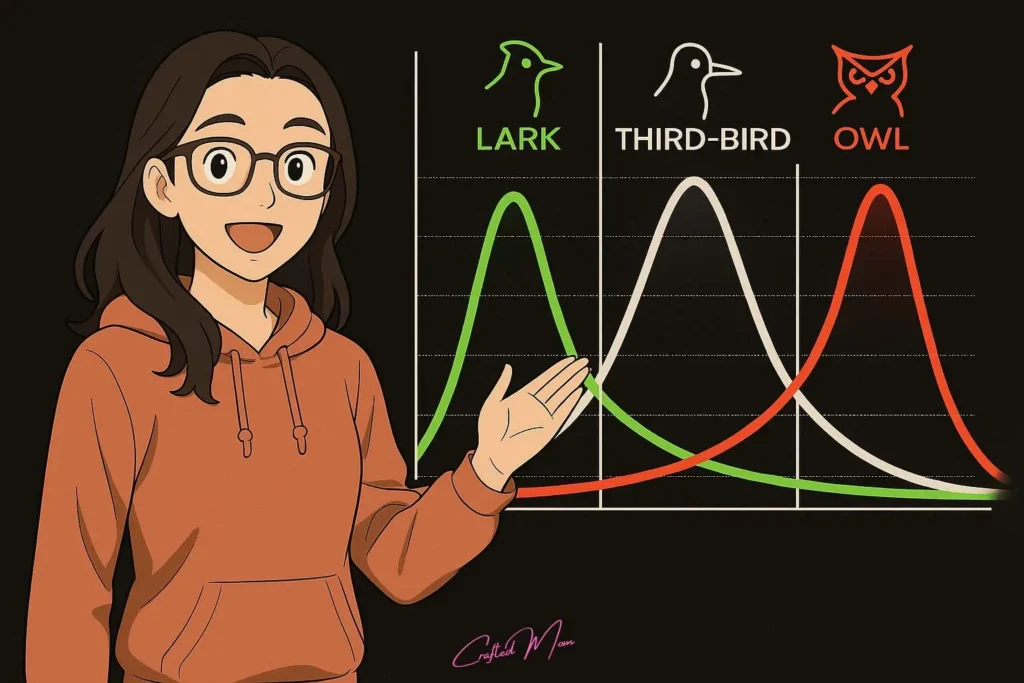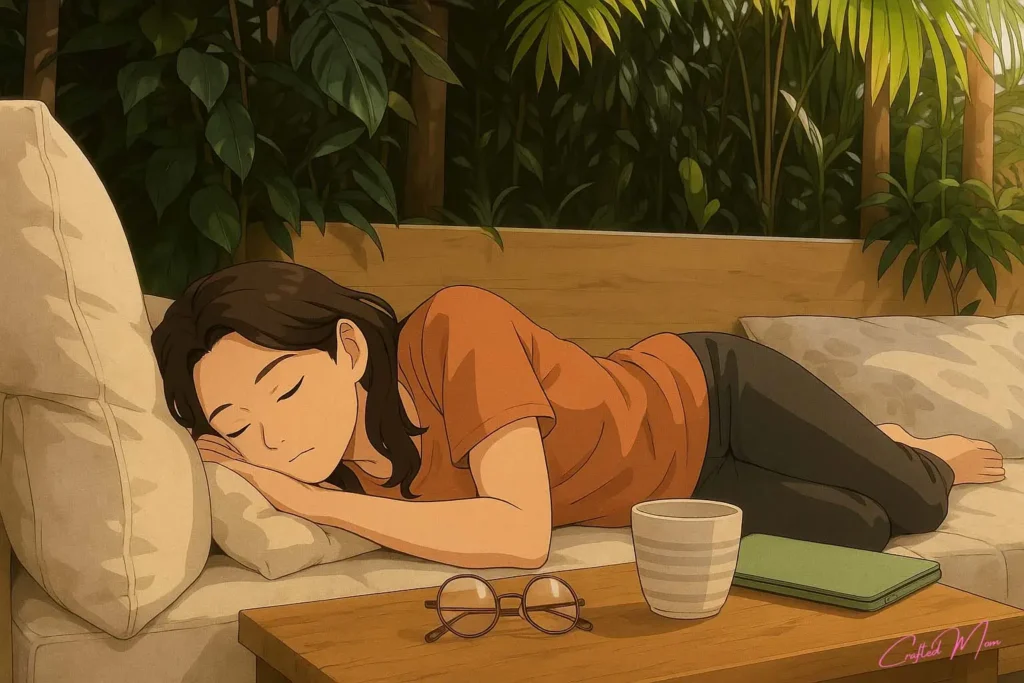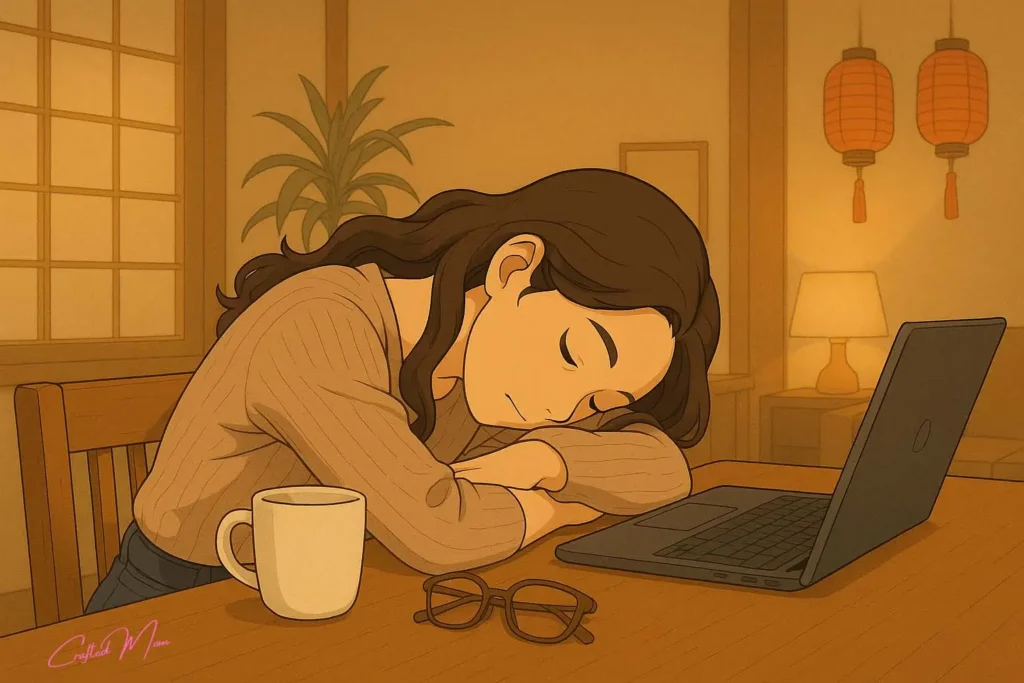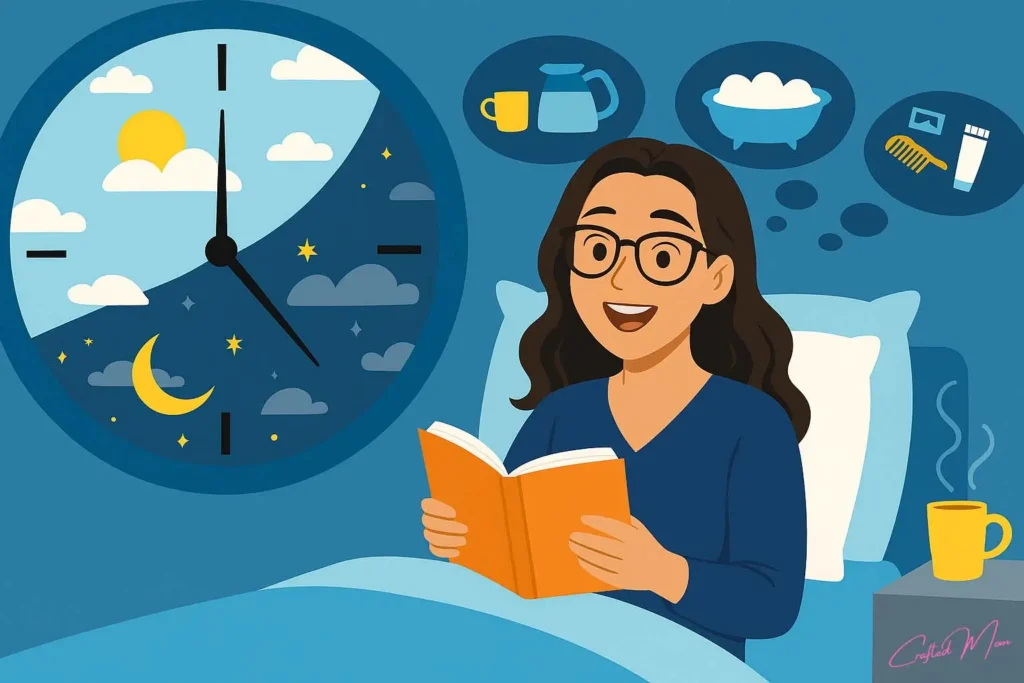If you feel like you’re constantly running on empty, even after a full night’s sleep and maybe three cups of coffee , trust me, you’re not alone. As a full-time psychologist and full-time mom (yes, both at once , send snacks), I know firsthand what it’s like to feel bone-tired before the day even begins.
But here’s the good news: there are real, science-backed reasons you’re dragging, and even better? There are real solutions too.
In this guide, I’m going to walk you through what might be zapping your energy, from poor sleep hygiene to sneaky nutrient deficiencies, and more importantly, how to fix it. These tips are pulled from credible research, expert insight, and yes, a whole lot of personal trial and error (spoiler: giving up coffee was not one of them).
Why You’re Always Tired
Let’s dive into what’s really going on with your tired body, and how you can finally start feeling like yourself again.
1. Are You Getting Enough Sleep? Start Here

Let’s start with the obvious, but most overlooked, reason for your constant yawning: you might not be getting enough real, restorative sleep.
What the Science Says About Sleep Duration
Research consistently shows that 7 to 8 hours of sleep is the sweet spot for most adults. Once you dip below that, especially under 6 hours, your brain starts functioning like you’re legally buzzed. Seriously. One study found that folks sleeping less than 6 hours a night had cognitive performance similar to someone who’s had a few drinks.
And if you’re pulling 4 hours or less regularly? That’s a fast track to chronic fatigue, mood swings, weakened immunity, and a whole menu of long-term health problems.
Why You Might Still Feel Tired (Even After Sleeping In)
If you’re thinking, “But I caught up last weekend!” , here’s the kicker: sleep debt is real, and unfortunately, one Saturday morning sleep-in doesn’t erase a week (or month) of bad habits. The body needs consistent, quality rest to fully recharge.
Think of it like paying off a credit card. One big payment helps, but if you’re still spending more than you’re earning, you’ll stay in the red.
If your energy levels are low, this is the first place to look and probably the easiest place to start fixing.
2. Understand Your Chronotype

Okay, here’s something I wish someone told me before I had kids and a full-time job,not everyone is wired to wake up at 5 a.m. and feel amazing. Some of us hit our stride at 10 p.m., and guess what? That’s not laziness, it’s biology.
Early Bird or Night Owl?
Your body’s sleep-wake cycle, called a chronotype, is influenced by your genes. Some people naturally rise with the sun, others do their best thinking long after dinner. Fighting that rhythm (say, forcing yourself into a 6 a.m. workout when your brain’s still in dreamland) can actually wreck your sleep quality and daily energy.
And if you have teens at home? Don’t blame them for sleeping till noon. During puberty, their melatonin release shifts later, meaning their bodies aren’t ready to fall asleep early, even if school still starts at 7:30 a.m.
💡 Pro tip: Instead of trying to force a different schedule, try to work with your natural rhythm. Your body, and your energy levels, will thank you.
3. Morning Habits That Set the Tone for Energy

How you wake up literally sets the tone for your entire day. I’m not saying you need to turn into a 5 a.m. green juice warrior (unless you’re into that), but a few small tweaks can majorly boost your energy and focus before breakfast.
Change Your Alarm Sound
If your alarm sounds like a fire drill, it’s time for an upgrade. Studies show that melodic alarms (think soft tunes, gentle chimes) reduce grogginess and improve mental clarity right after waking. Ditch the blaring sirens, they’re stressful before you even open your eyes.
Avoid the Snooze Button
I know, I know, it’s tempting. But hitting snooze disrupts your sleep cycle and increases something called sleep inertia (aka that foggy, can’t-form-a-thought feeling). You’re better off getting 10–20 minutes of uninterrupted sleep than fractured mini-naps that leave you more tired.
Move for 30 Seconds After Waking
I’m not talking full-on jumping jacks here. Just a quick stretch, shoulder roll, or walk to the bathroom can boost alertness and shake off sluggishness. Even 30 seconds of movement sends a wake-up signal to your brain.
Get That Morning Sunlight
This one’s a game-changer: 30–60 minutes of natural light in the morning can help reset your circadian rhythm, making you feel more awake during the day and sleepier at night, right when you want to be. Open those curtains, sit outside, walk the dog… whatever gets you under that sky.
Hydrate First Thing
After 7–8 hours of sleep, your body is dehydrated. That dryness can mess with your concentration, mood, and energy levels. A simple glass of water in the morning? Small effort, big payoff.
4. How Caffeine Affects Energy and Sleep

Look, I love my morning coffee. It’s a ritual, a comfort, and let’s be honest, sometimes the only thing standing between me and total meltdown before school drop-off. But if you’re feeling wired and tired, caffeine might be playing a bigger role than you think.
Smart Caffeine Usage
Caffeine works by blocking adenosine receptors in your brain. Adenosine is that sleepy-time chemical that builds up the longer you’re awake. So when caffeine blocks it? You feel more alert.
But here’s the catch: the more you rely on it, the more your body adjusts by building more adenosine receptors. Over time, that means you need more caffeine to get the same effect, and you crash harder when it wears off.
Translation? That third cup may not be helping anymore. It’s just keeping you afloat.
Avoid Caffeine After 2 PM
Caffeine has a half-life of about 6 hours, which means that innocent cup of coffee at 3 p.m. could still be in your system at 9 p.m., quietly sabotaging your deep sleep.
Even if you think you’re sleeping fine, studies show that late-day caffeine can reduce slow-wave sleep, the deepest, most restorative stage. That means you’ll wake up feeling less rested, even after a full 8 hours.
5. Diet and Energy: Fuel Your Body Right

You’ve heard it before, but let me say it louder for the tired mamas in the back, what you eat absolutely impacts how you feel. Not just in the “I feel bloated after that drive-thru meal” kind of way, but in real, science-backed effects on your energy, sleep, and mood.
Focus on Whole Foods (Your Body Will Thank You)
Processed foods that are high in sugar and low in fiber might give you a quick boost, but they also lead to energy crashes and restless nights. One study even found that poor diet quality is linked to less non-REM sleep and more frequent nighttime awakenings.
Think of it this way: If you fuel your body with junk, your energy will feel like junk too.
Stick with whole, unprocessed foods like veggies, lean proteins, healthy fats, and complex carbs that support stable blood sugar and better sleep cycles.
Don’t Eat Right Before Bed
Late-night snacking? I get it, kids go to bed, the house is finally quiet, and suddenly you’re face-first in a bag of popcorn. But here’s the deal: eating close to bedtime keeps your digestive system active, which can make it harder to fall asleep and reduce the depth of your sleep.
Try to keep a 2–3 hour buffer between your last meal and bedtime. Your body needs rest, not to be working overtime on digestion.
6. Exercise: The Energy Multiplier

I know, when you’re already tired, the last thing you want to do is lace up your sneakers. But here’s the twist: moving your body is one of the best things you can do to feel less exhausted.
Why Movement Matters
Regular physical activity has been shown to help you fall asleep faster and sleep more deeply, two big wins for anyone running on fumes. And don’t worry, I’m not talking about hour-long boot camps. Even a 20-minute walk around the block or a quick dance session in your kitchen counts.
In fact, research from Johns Hopkins found that people who exercise regularly report better sleep quality and increased daytime energy.
Tired all the time? Movement might be the medicine your body’s begging for.
Skip Late-Night Workouts
While movement is magical, timing matters. Working out too close to bedtime can keep your core body temperature high and delay melatonin production, making it harder to drift off.
Aim to finish workouts at least 2 to 3 hours before bed, so your body has time to cool down and shift into wind-down mode.
7. Mastering the Art of Napping

Let’s clear something up, napping isn’t lazy, it’s strategic. When done right, a nap can feel like hitting the refresh button on your brain. When done wrong? Hello grogginess, goodbye bedtime.
When and How Long to Nap
There’s definitely a sweet spot when it comes to snoozing during the day. Here’s what the science says:
- 20–30 minutes is ideal if you need a quick boost in focus, mood, and alertness without that heavy post-nap fog
- 90 minutes gives your brain time to complete a full sleep cycle, which can be helpful if you’re seriously wiped out or catching up after a rough night
But be careful with timing. Napping after 3 PM can mess with your body’s natural rhythm and make it harder to fall asleep at night, even if you’re tired.
Pro tip from one tired mom to another: Keep a soft eye mask and earplugs nearby. A quick power nap while the kids are at school? Total game changer.
8. How Alcohol Ruins Sleep

I know, I know, a glass of wine after a long day feels like self-care. And honestly, sometimes it is. But if you’re constantly waking up groggy, alcohol might be silently wrecking your sleep quality.
Why That Nightcap Isn’t Helping
Sure, alcohol can help you fall asleep faster, but here’s the catch: it suppresses REM sleep, the dream-rich phase where your brain does its best emotional and cognitive housekeeping.
What’s more, it causes fragmented sleep, meaning you’re more likely to wake up during the night, especially in the early morning hours when alcohol is being metabolized. You might not even remember waking up, but your body feels it the next day.
That’s why even if you sleep a full 8 hours after drinking, you can still feel foggy, irritable, and low-energy.
If you’re relying on alcohol to unwind, try switching it up once or twice a week. Herbal tea, a warm shower, or a good book might just leave you feeling way more refreshed come morning.
9. Pre-Bed Routine for Better Sleep

Look, I get it. Once the kids are asleep, that stretch of quiet before bed is sacred. But if you’re using that time to scroll TikTok in a bright room with the TV blaring in the background, you’re not exactly setting yourself up for great sleep.
Take a Warm Shower or Bath
One of my favorite nighttime rituals (especially when I need to mentally clock out) is a warm shower or bath about an hour before bed. It sounds simple, but it helps your body naturally cool down afterward, which is a key trigger for sleepiness. Think of it as a gentle signal to your brain that it’s time to chill, literally.
Create a Dark, Cool Sleep Environment
Darkness tells your brain, “Hey, melatonin, do your thing.” Light, especially from lamps, screens, or glowing alarm clocks, confuses that signal. So:
- Keep your room dark, quiet, and cool
- Cover or turn off bright clocks
- Use blackout curtains or a comfy sleep mask if needed
Your bedroom should feel like a cave, not a conference room.
Ditch the Phone
I know how tempting it is to “just check one thing”, but blue light delays melatonin, and that endless scroll keeps your brain in go-go-go mode. If you can, put your phone in another room or at least switch to airplane mode and wind down with a real book instead.
10. When You Can’t Sleep, Do This

We’ve all been there,tossing and turning, staring at the ceiling, mentally calculating how little sleep we’re about to get. It’s the worst. But here’s the trick: lying in bed while stressing about not sleeping only makes things worse.
Get Out of Bed (Yes, Really)
If you’ve been awake for 30 minutes or more, don’t keep forcing it. Your brain starts to associate your bed with frustration instead of rest. Instead, get up and do something calming, read a book, stretch gently, sip herbal tea. Just keep the lights low and screens off.
Stop Clock-Watching
Constantly checking the time? Guilty. But it’s a fast way to spike your cortisol levels and send your stress through the roof. Watching the clock ticks you further from sleep. Flip it over, move it across the room, or turn it off entirely.
Remember: Your goal isn’t to force sleep, it’s to invite it back in, gently, without pressure.
11. Medical Issues: When to Seek Help

Let’s be real, sometimes no amount of naps, kale, or melatonin gummies is going to fix your fatigue. If you’ve tried everything and still feel like a zombie most days, it’s time to talk to a healthcare provider.
When Exhaustion Isn’t Just Lifestyle
There are real, treatable medical conditions that can mess with your energy and sleep, even if you’re doing all the “right” things. A few worth looking into:
- Sleep apnea: Causes brief, repeated breathing interruptions during sleep. You may not realize it’s happening, but your body sure does.
- Thyroid imbalances: Especially hypothyroidism, which slows everything down (including your energy and mood).
- Nutritional deficiencies: Low iron, B12, or vitamin D can leave you feeling chronically drained.
- Other hidden culprits: Anxiety, depression, perimenopause, or even undiagnosed chronic fatigue syndrome.
Bottom line? You don’t have to live tired. If your exhaustion is unshakable, get checked out. You deserve to feel rested, focused, and fully present in your life.
12. The Power of a Consistent Sleep Schedule

If you’ve made it this far, I’ve got one more truth bomb for you, and it’s a biggie: consistency beats quantity when it comes to sleep.
Why Routine Is Everything
Your body thrives on rhythm. Going to bed and waking up at the same time every day, even on weekends, trains your internal clock (aka your circadian rhythm) to work in your favor. That means you’ll fall asleep faster, wake up more refreshed, and stop feeling like you’ve been hit by a truck every Monday.
Now here’s the twist: even if you technically get 8 hours, going to bed at 10 p.m. one night and 1 a.m. the next can throw your system out of sync. Inconsistent sleep patterns confuse your brain, mess with melatonin, and tank your overall sleep quality.
Think of your sleep schedule like a toddler,it needs structure and doesn’t like surprises.
Start by choosing a realistic bedtime and wake time, then stick with it as best you can. Your future, well-rested self will thank you.
Conclusion: The Big 3 That Changed My Life
After years of running on fumes (and way too much coffee), I finally cracked the code on lasting energy, and it didn’t come from a magic supplement or fancy tracker.
It came down to three simple but powerful shifts:
- 1. Prioritizing My Sleep Schedule:
- Same bedtime. Same wake-up time. Every. Single. Day. It was hard at first, but my body loves the rhythm now,and so does my brain.
- 2. Moving My Body (Even When I Didn’t Want To):
- I stopped treating exercise like punishment and started seeing it as fuel. Even a 15-minute walk clears my mind and lifts my energy.
- 3. Eating for Energy:
- Whole foods, fewer crashes, and no more sugar binges at 3 p.m. (Okay, maybe fewer sugar binges.)
Frequently Asked Questions:
Why am I always tired even after getting enough sleep?
Even with 7–8 hours in bed, interrupted sleep from kids, mental overload, or poor sleep quality can leave you drained the next day.
What is Depleted Mother Syndrome?
It’s a form of chronic exhaustion moms face when juggling too much without enough support, rest, or time to recharge emotionally and physically.
How can I stop feeling tired all the time as a mom?
Focus on quality sleep, eat balanced meals, move your body, ask for help when needed, and check with a doctor to rule out health issues like anemia or thyroid problems.

